The American Library Association has a Bill of Rights, adopted on June 19, 1939, as a response to book burnings in Nazi Germany. As director and narrator Dawn Logsdon describes in her documentary “Free for All: The Public Library,” these horrors inspired America's librarians to codify their unifying principles into a document.
Although its seven articles have been amended and interpreted in different ways throughout the years, they still guide today's literary custodians, with the foremost being to stand against censorship.
“Books and other library resources should be provided for the interest, information and enlightenment of all people of the community the library serves,” reads Article I. “Materials should not be excluded because of the origin, background or views of those contributing to their creation.”
"When it comes to the history of the public library, what's so beautiful about it is that it is this continuing journey towards making our American ideals real."
Understanding this clarifies why the Trump Administration is threatening the country's library system.
“When it comes to the history of the public library, what's so beautiful about it is that it is this continuing journey towards making our American ideals real, but it's a real struggle, Logsdon told Salon. “It's not like we started out with everybody free and equal and welcome at the library.”
When I spoke to Logsdon and Lucie Faulknor, producer and co-director of "Free For All," they were in Boston to present a screening at its library, part of a community tour that includes showings in New York, Philadelphia and Washington D.C.
This is the prelude to the film's PBS debut on "Independent Lens" at the end of April. But its message is especially urgent right now.
On March 14, President Donald Trump signed an executive order titled “Continuing the Reduction of the Federal Bureaucracy," which calls for several government agencies to be “eliminated to the maximum extent consistent with applicable law,” including the Institute of Museum and Library Services, or IMLS.
The IMLS is an independent federal agency that supports 125,000 public, school, academic and special libraries and museums in all 50 states and territories, according to the American Library Association. It administers both federal grants to states and discretionary grants to individual library entities. It also contributed outreach funds to “Free for All.”
Libraries are the nexuses of democratized access to culture, community expertise, diverse perspectives on history and the instruments that further that knowledge. They also are gathering spots and safe spaces for the vulnerable.
“People who are in library leadership, on boards, and certainly librarians even today, are not interested in limiting, shaping, prescribing how that creative and generative expression should be had,” says John Chrastka, Executive Director and founder of the non-profit advocacy organization EveryLibrary. “They're just interested in making sure that everybody's got a fair shake to get to it.”
This may be why the Trump administration is set on starving our nation’s libraries to death, or close enough to it.
“Article II: Libraries should provide materials and information presenting all points of view on current and historical issues. Materials should not be proscribed or removed because of partisan or doctrinal disapproval.”
If you grew up in the pre-Internet age, your local library probably played some role in your upbringing.
Libraries are the nexuses of democratized access to culture, community expertise, diverse perspectives on history and the instruments that further that knowledge.
But if you talk to most adults today, they will likely tell you they haven’t visited their local library in many years, if ever. To Trump’s administration and his extreme right allies, they are somehow insufficiently patriotic. Extremist groups like Moms for Liberty allege that they "indoctrinate" children into learning far-left ideology by allowing them to access “inappropriate” reading material.
A more common position is that the Internet and digital technologies have made libraries unnecessary. But this is largely predicated on the inaccurate idea that your local library’s sole purpose is to lend books.
You can rent films and borrow the latest music releases at your local library, or sign up for free museum passes. Many also make tools and other household implements available to library cardholders. Libraries offer English classes, provide resources to attain citizenship and assist small businesses. Some host sessions with tax experts.
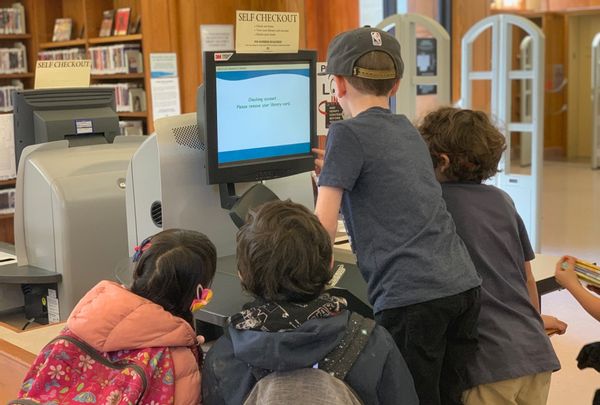 Kids at the self check-out at the Presidio Branch of the San Francisco Public Library (Lucie Faulknor)They might also be their community’s most reliable source for Internet access, if not the only one.
Kids at the self check-out at the Presidio Branch of the San Francisco Public Library (Lucie Faulknor)They might also be their community’s most reliable source for Internet access, if not the only one.
Among what the ALA estimates to be more than 1.2 billion in-person visits annually to libraries around the country, homeschoolers are among the system's most avid patrons.
One of the people Logsdon and Faulknor introduce in “Free for All” is Rebecca Kirchberg, a Columbus, Wisconsin, resident who, at the time of filming, had 14 children and another on the way. Her small town's local library is essential to her children's education.
“We don’t get a lot of the school information, and having that library to really pull us together into the community has been so helpful for us,” Kirchberg says in the film as her kids peruse the shelves. She adds that their library influences them as “a faith-filled family that’s always looking to learn and explore.”
“If you don’t have good information,” Kirchberg adds, “there’s no way you can make good decisions.”
“Article III: Libraries should challenge censorship in the fulfillment of their responsibility to provide information and enlightenment.”
“Article IV: Libraries should cooperate with all persons and groups concerned with resisting abridgment of free expression and free access to ideas.”
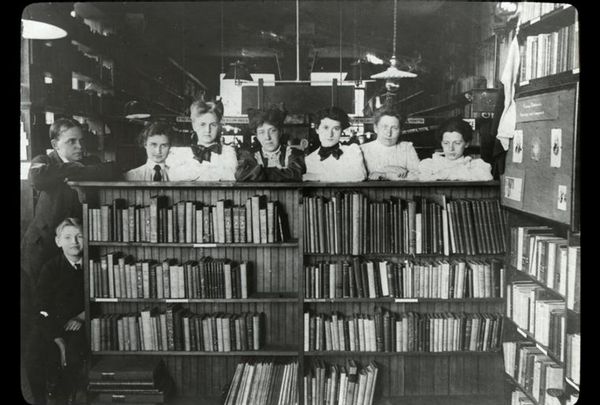 Webster Free Circulating Library staff circa 1904 (Courtesy of New York Public Library)Trump’s March 14 order also calls for the elimination of the Woodrow Wilson International Center for Scholars in the Smithsonian Institution, which was further targeted in another executive order signed on Thursday, March 27, titled “Restoring Truth and Sanity to American History.”
Webster Free Circulating Library staff circa 1904 (Courtesy of New York Public Library)Trump’s March 14 order also calls for the elimination of the Woodrow Wilson International Center for Scholars in the Smithsonian Institution, which was further targeted in another executive order signed on Thursday, March 27, titled “Restoring Truth and Sanity to American History.”
An accompanying fact sheet directs Vice President JD Vance, a member of the Smithsonian Board of Regents, “to work to eliminate improper, divisive, or anti-American ideology” from the Smithsonian’s museums, education and research centers and the National Zoo.
This is unprecedented at the Smithsonian, the nation’s preeminent historical archive. Its iconic status ensured that Thursday's executive order drew immediate national attention.
But another assault on public libraries was already in motion, although fewer people may have noticed.
On Thursday, March 20, Trump appointed Deputy Secretary of Labor Keith E. Sonderling as the Acting Director of the IMLS.
“I am committed to steering this organization in lockstep with this Administration to enhance efficiency and foster innovation,” Sonderling said in an agency press statement. “We will revitalize IMLS and restore focus on patriotism, ensuring we preserve our country’s core values, promote American exceptionalism and cultivate love of country in future generations.”
"We’re going to be on a collision course with the Trump administration over the constitutional compliance for libraries, as opposed to being compliant with the Trump administration framework."
“Just the words ‘patriotic history’ scare me to death,” Logsdon said. “I grew up in the Deep South . . . and I was the tail end of [learning] the Southern version of history. Up to that point, it was like, ‘Oh, the North were the bad carpetbaggers,’ and ‘slavery was a benevolent institution.’”
“I think that's what they have in mind when they say ‘patriotic history,’” she concluded.
As is the case with the March 27 executive order, what materials or functions meet the qualifications spelled out in this order isn't clear. Presumably, that is the point.
“That aspect of things needs to be taken head-on because libraries fundamentally are constitutional organizations already,” Chrastka said. Libraries honor the five freedoms cited in the First Amendment: freedom of and from religion, freedom of speech, freedom of the press, the right to assemble and the right to petition.
“That means we’re going to be on a collision course with the Trump administration over the constitutional compliance for libraries, as opposed to being compliant with the Trump administration framework,” he added.
“Article V: A person’s right to use a library should not be denied or abridged because of origin, age, background, or views.”
Public libraries are meant to eliminate barriers to knowledge long held by the wealthy. This concept extends back to Benjamin Franklin’s founding of the first public library in 1731. The reason for this, as historian Jill Lepore says in “Free for All,” is that Franklin believed a government by and for its citizens should have an educated populace.
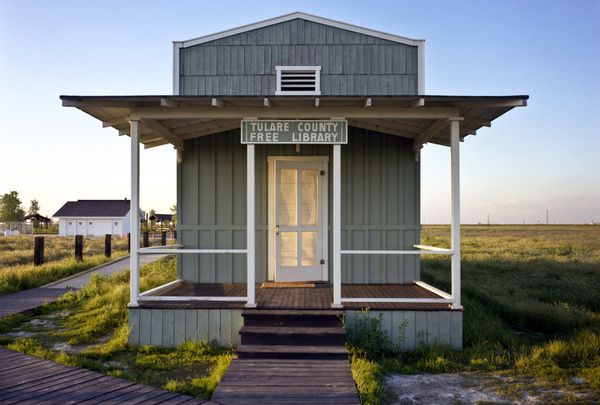 Tulare County Library (Robert Dawson)On the cusp of America’s 250th anniversary celebrations, there are many debates about what our constitutionally-established rights afford us and to whom those protections extend. But there is also a rising discourse around the need to strengthen the fabric of our communities by connecting with our neighbors, making libraries one of the most effective “third places” in American life.
Tulare County Library (Robert Dawson)On the cusp of America’s 250th anniversary celebrations, there are many debates about what our constitutionally-established rights afford us and to whom those protections extend. But there is also a rising discourse around the need to strengthen the fabric of our communities by connecting with our neighbors, making libraries one of the most effective “third places” in American life.
Sociology professor Ray Oldenburg coined that term, expounding its necessity in his book "The Great Good Place” and the essay collection “Celebrating the Third Place.” He proposed that home and work are our first and second “places,” with “people places” designed to strengthen local ties and foster the common good constituting these “third” spaces.
Libraries, of course, fit the bill, providing workshops, public readings and performances, along with arts and crafts classes. “Joyful association in the public domain is far better than watching television in our lifeless subdivisions,” Oldenburg proclaimed in a 2014 New York Times op-ed.
We need your help to stay independent
But for many, today's libraries represent some combination of all three spheres. Libraries double as work spaces. After-school programs provide childcare. Central libraries in major urban centers provide a safe harbor for unhoused people to sleep during the day. They might also host free medical clinics and wellness classes.
“Library professionals want to stand in gaps. That's one of the things that they're good at,” Chrastka said. “They're standing in knowledge gaps, you know – ‘here's there's the good stuff in the archives, read it’ – and they also have a deep empathy, I would suggest, because they are readers.”
“Reading builds empathy,” Chrastka continued. “So when you see gaps in the social services, when you see that another component of government has been taken over by an anti-person perspective and says, ‘those people aren't valued,’ librarians have stepped up.”
According to the ALA, library funding draws less than 0.003% of the annual federal budget yet makes a substantial local impact. “From technology classes for job seekers to services for people with disabilities, from library delivery for older Americans to summer reading programs for families, IMLS funding makes a real, concrete difference in the lives of Americans every day,” its website reads. “The president’s executive order puts all of those services at risk.”
Trump’s March 14 executive order doesn’t directly eliminate IMLS because that would exceed executive authority, the ALA explains. Instead, it aims to hollow out the agency, “[reducing] the performance of their statutory functions and associated personnel to the minimum presence and function required by law.”
The president’s order also creates an artificial fiscal cliff. Although he signed the Senate-approved continuing resolution for fiscal year 2025 that provides funding for IMLS through September, the executive order overrides Congress’s intent.
In Logsdon's view, “It's not really about the money. Do you know what I mean? That's clear to me. It's about politics and it's about having targets.
“Article VI: Libraries which make exhibit spaces and meeting rooms available to the public they serve should make such facilities available on an equitable basis, regardless of the beliefs or affiliations of individuals or groups requesting their use.”
Out of all the public institutions under fire by this government, why libraries? Logsdon doesn’t have the answer to that, but points to an observation made by one of the scholars in “Free for All.” The library is free and open, and it's unregulated in many ways, they said. Everybody can come in, and that makes it unpredictable, and unpredictable can be scary.
“You know, it's about free access. It's not about reading only patriotic history or whatever is prescribed by your lesson plan,” the filmmaker added. “It's about the freedom to explore all the ideas that are out there.”
That principle has been tested many times through book banning efforts. Moms for Liberty and others have loudly demanded the removal of many books from school and community libraries over the years, but the rise of Drag Story Hour gave it and other extremists a convenient scapegoat.
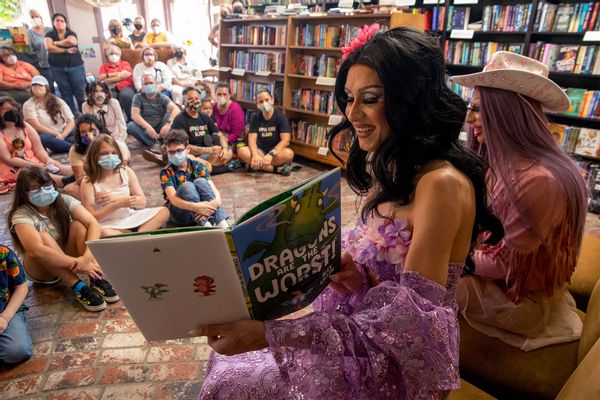 Drag Queens Kelly K, left, and Scalene OnixXx read story book on the last Drag Queen story hour at Canyon Crest Town Centre location of Cellar Door Bookstore on Saturday, April 29, 2023 in Riverside, CA. (Irfan Khan / Los Angeles Times via Getty Images)Viewers got a taste of this on Wednesday, March 26, when Rep. Marjorie Taylor Greene, R-Ga., used a photo of Drag Story Hour board member Lil Miss Hot Mess as a prop at a televised House subcommittee meeting attacking PBS and NPR.
Drag Queens Kelly K, left, and Scalene OnixXx read story book on the last Drag Queen story hour at Canyon Crest Town Centre location of Cellar Door Bookstore on Saturday, April 29, 2023 in Riverside, CA. (Irfan Khan / Los Angeles Times via Getty Images)Viewers got a taste of this on Wednesday, March 26, when Rep. Marjorie Taylor Greene, R-Ga., used a photo of Drag Story Hour board member Lil Miss Hot Mess as a prop at a televised House subcommittee meeting attacking PBS and NPR.
Greene was alarmed that Lil Miss Hot Mess had starred in a digital segment for “Let’s Learn,” an educational series produced by the WNET Group in New York. The congresswoman's stunt blindsided the performer because she filmed the segment back in 2021. She was asked to contribute to the children's series because she has written several children’s books and performed readings at libraries in New York, Los Angeles and other places. She’s also a university professor.
Lil Miss Hot Mess has participated in Drag Story Hour since 2016. What won her over was witnessing what she described as “the joy and creativity and play that was happening in these libraries – it was magical.”
Making a sentimental case for public libraries is easy. They are repositories of history, thought and memory — shared and personal.
At the same time, Lil Miss Hot Mess was always waiting for the other shoe to drop. “I think politicians, leaders of mainstream LGBT organizations, leaders of mainstream literacy, education, arts organizations thought that Drag Story Hour at best was kind of cute, and maybe at worst was a little bit of a nuisance,” she said.
“But I think many of us had this feeling that we're the canary in the coal mine,” she added, “not only around targeting LGBT and especially trans people, but also starting to target public institutions like libraries and schools to try to defund them.”
Chrastka agrees, tracing conservatives’ library vilification back to the classic dog whistles of race and gender, with book bans serving as a proxy for attacking those populations. Once literacy censors realized racial animosity wasn’t working, tactics shifted to demonizing queer literature, particularly books about the trans experience.
“The attacks on the profession and the institution have evolved tremendously," he said. "The language has been purified in a certain respect and honed, but it has been out long enough now that there are certain populations that do not have to be convinced. They only have to be updated on who’s the current enemy.”
Want a daily wrap-up of all the news and commentary Salon has to offer? Subscribe to our morning newsletter, Crash Course.
“Article VII: All people, regardless of origin, age, background, or views, possess a right to privacy and confidentiality in their library use. Libraries should advocate for, educate about, and protect people’s privacy, safeguarding all library use data, including personally identifiable information.”
Making a sentimental case for public libraries is easy. They are repositories of history, thought and memory — shared and personal. But warm sentiment is easily dismissed as frivolous. Libraries should not be.
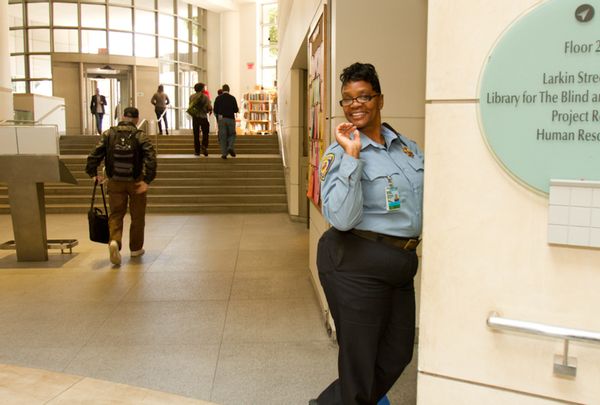 Gloria Cowart pictured at the San Francisco Public Library (Anita Bowen). In its response to the March 14 executive order, the ALA reminded the president and Congress that libraries are “seedbeds of literacy and innovation.” Philosophically, that makes them fundamentally American places. In a society whose public educational system is underfunded and whose rural communities are often shortchanged in resource allocations, they are essential. It’s also helpful to know that if you were to use library materials to research subjects considered to be controversial or threatening to whoever is in power, the Library Bill of Rights calls for your librarians to shield your reading list and other personal information.
Gloria Cowart pictured at the San Francisco Public Library (Anita Bowen). In its response to the March 14 executive order, the ALA reminded the president and Congress that libraries are “seedbeds of literacy and innovation.” Philosophically, that makes them fundamentally American places. In a society whose public educational system is underfunded and whose rural communities are often shortchanged in resource allocations, they are essential. It’s also helpful to know that if you were to use library materials to research subjects considered to be controversial or threatening to whoever is in power, the Library Bill of Rights calls for your librarians to shield your reading list and other personal information.
If the IMLS is eliminated, wealthier cities probably will not lose their main libraries. But branches in far-flung exurbs and small towns will be devastated.
As Chrastka observes, “The idea that we have to treat public libraries and the public good as if it were a commercial entity for it to be validated is a problem in American thought.” Indeed, the common good should be held to a different standard that’s impervious to the whims of the ideologically narrow.
Logsdon said that the longer she worked on “Free for All,” the more she noticed how often conflicts over access, funding and censorship kept coming back. “The same battles they were fighting in the 1850s here in Boston about what kind of books belong in the library are back again,” she said. “You never win. You just have to keep fighting.”
"Free for All: The Public Library" premieres 10 p.m. Tuesday, April 29 on PBS' "Independent Lens." The film will also be available to stream on the PBS app. To find out what you can do to help save public libraries, visit the American Library Association's website.


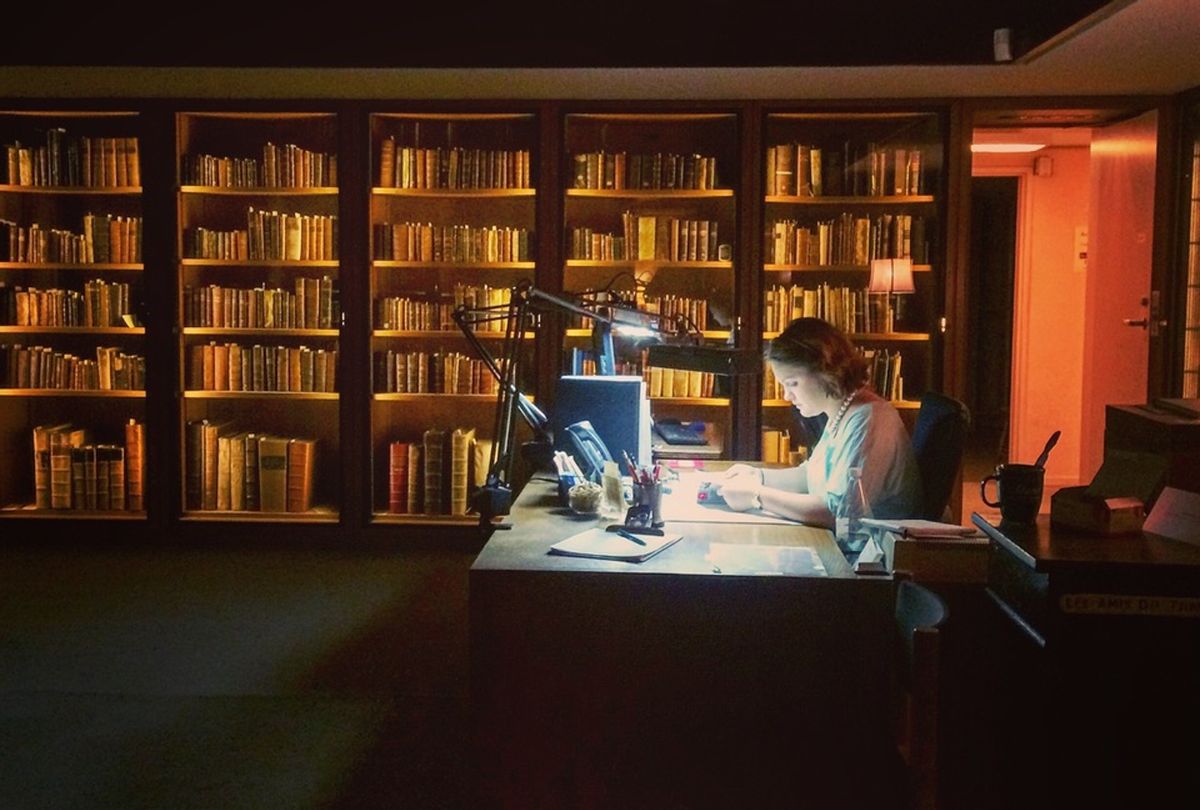
Shares